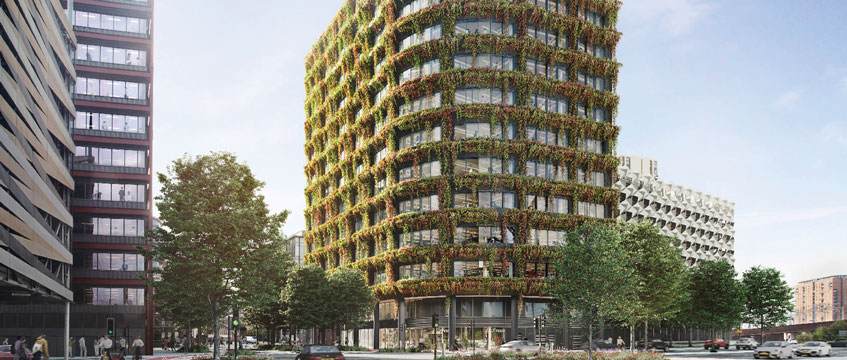COMMENT: Just over 12 months ago, bushfires raged in Australia. Sea levels continue to rise. Last year was the warmest on record and we have seen numerous extreme weather events in the UK. All those involved in property have a responsibility to to do our bit to tackle the climate emergency.
There is no more time to waste. We can’t carry on designing and building the way we always have. We’re going to have to rip up the rule book if we want to make an impact – and we have to be bold. It’s really encouraging that we’re seeing a big push from across the sector and there’s legislation and policy on the way to help.
The Financial Stability Board created the Taskforce on Climate-related Financial Disclosures to improve and increase reporting of climate-related financial information. Occupiers are creating net zero carbon roadmaps and want to provide sustainable, healthy workplaces for their colleagues. Our local authority partners are committed to reducing carbon in their areas.
The Covid pandemic holds lessons for us all. People have connected to outdoor space, and we’ve seen an increase in cycling and walking and more sustainable working arrangements. Can we make the most of these lessons?
Greenwashing hinders progress
We know there are challenges. Developing energy efficient and sustainable places is not as easy as creating traditional ones. More careful design is needed by passionate design teams. It can cost more, and it can take more time.
That’s why a step change is needed, and quickly. There are huge opportunities for individuals and businesses to embrace this challenge, develop the necessary skills and become industry leaders in this respect.
One area that needs quick change is the lack of transparency, as there remains a huge amount of greenwashing. How can someone say they have a net zero carbon building when it’s still in the design or construction stage? It’s currently too easy to create false statements. Not only does that not mean change, but it hinders progress. We need standardised definitions, targets, methods of measurement and a certification processes to bring clarity and honesty.
Net zero carbon remains the buzz phrase, but there needs to be an equal focus on wider climate resilience. Nature-based solutions that increase biodiversity and create more sustainable infrastructure and drainage are critical. Greenhouse gas emissions are clearly a fundamental part, but should not be the sole focus.
And is offsetting really the best strategy? A poor-performing building that has offset all its carbon is still a poor-performing building. Offsetting is part of the solution, but focus is needed on how to design and construct buildings that create minimal carbon to offset in the first place.
So, how do we do it? We’re going to have to break the rules. We can’t keep doing the same thing, the same way. And compromises are needed.
Office buildings can’t be fully glazed, columns are needed in floorplates, certain BCO standards need to be relaxed. We need to be more far more stringent on the performance of facades and better standards of construction are needed. There is no silver bullet in designing a truly sustainable building. Every aspect of the design needs scrutinising and refining.
A clear brief is needed, and you need to be regimented to keep pursuing that brief. As a client you’ve got to maintain belief in the brief. Never take the easy answer at the expense of the aspirations you have set. But don’t worry if you can’t do everything. A building that’s committed to being net zero in operation, but not quite hitting the embodied carbon targets, is still a vast improvement.
Up for the challenge
At Muse, we’re about to launch our company-wide sustainable development strategy. This includes five objectives which sit above clear, measurable and reportable KPIs specifically developed for each building type. The strategy is focused on making sure we deliver sustainable developments and we’ll be completely transparent about our performance.
We’re excited about our new commercial building at New Bailey in Salford, which is committed to being net zero in operation, and we’ll verify its performance using the new NABERS UK rating scheme. This will provide the benchmark for future commercial schemes. Our parent company, Morgan Sindall, has also committed to being net zero by 2030 and will highlight a clear roadmap to get there.
We’re looking forward to the challenge. Our commitment to delivering honest, transparent, sustainable and transformational regeneration, that drives growth and prosperity to benefit communities, is unwavering.
Phil Marsden is project director at Muse Developments











